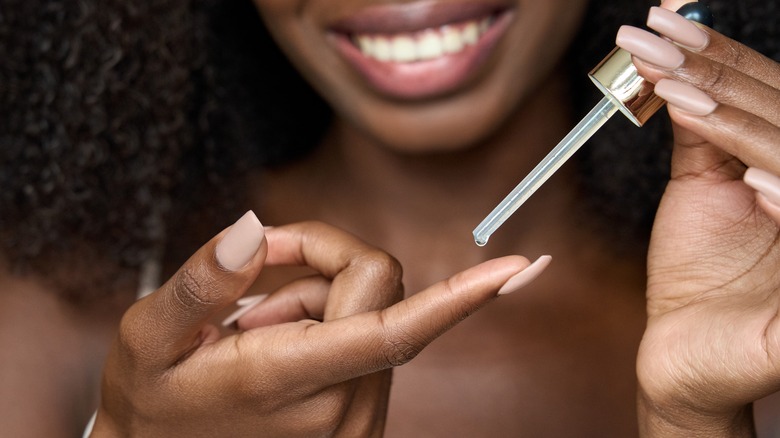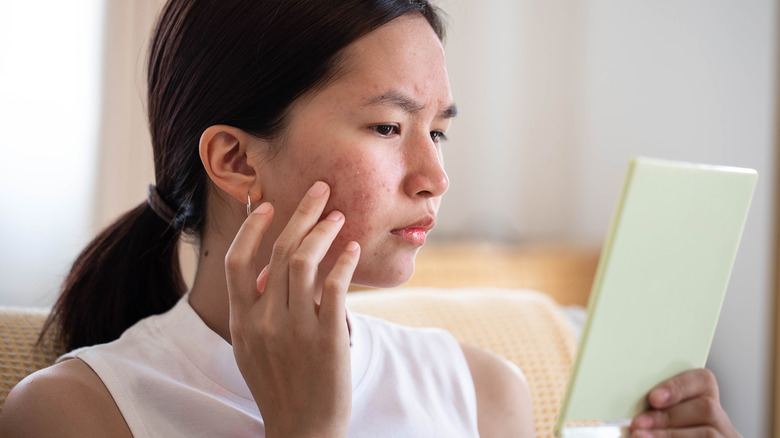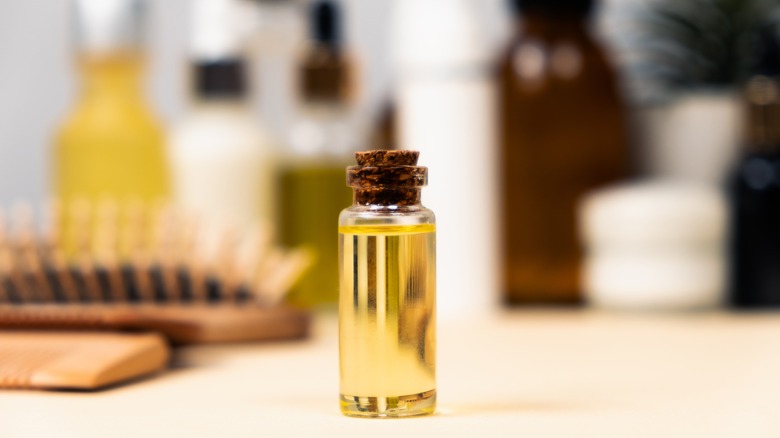The Unexpected Benefits Oregano Can Have For Your Skin
If you're like a lot of people, you probably think of pizza when you hear the world oregano. You can't, after all, have a proper Italian dish without it. But as much as oregano is one of the most important spices to the culinary world, it's also turns out to be fantastic for the skin too.
As a member of the mint family, oregano, or as the botanists call it, Origanum vulgare, is chockfull of healing properties for every part of the body. According to a 2017 study published in Molecules, oregano in the form of an essential oil is so potent in fighting bacteria, fungus, and viruses that it can actually suppress cancer agents and aid in the fight against diabetes. If oregano can do that much good on the inside of the body, just think about the positive effects it can have on the outside — it's going to blow your mind.
But does this mean you should reach for the oregano in your kitchen and start rubbing it all over your face? Not quite. Instead, if you want to work it into your beauty routine, look to using an oil. "If you want to use oregano essential oil itself, mix one or two drops of the oil with a 'carrier' oil — or water if your skin trends on the oily side — and apply after cleansing," double-board certified facial plastic surgeon Jaimie DeRosa, MD tells Well + Good. "Delivering those beneficial ingredients to the skin continually night and day will keep the skin appropriately nourished and will provide benefits on a round-the-clock basis." And those benefits are plentiful, so hold on to your pants.
It can supplement your acne-fighting skincare
Along with being a natural antiseptic, the oregano oil is also antibacterial, making it just right for fighting breakouts. In fact, per a 2023 lab study, compared to other essential oils, oregano delivered the strongest response against acne-causing bacteria, like S. aureus and Staphylococcus epidermidis. And that's not all. The study also suggested that oregano oil may be more successful at fighting these bacteria than some of the topical antibiotics typically prescribed by dermatologists, like clindamycin and a tretinoin. On top of that, oregano oil doesn't come with any risk of developing antibiotic resistance, which is when a drug no longer is effective because your skin has gotten used to it.
However, while the research is promising, more human studies are needed to confirm how effective topical oregano oil is at actually preventing acne, especially in the long-term. Presently, most of the research done has looked at isolated lab studies and the response on rat skin, not actual people. However, some experts highlight that using products that contain oregano oil — like an anti-acne gel — may be beneficial to supplement an existing acne-fighting routine.
It may help with inflammation
Great skin means calm skin. But for some people, maintaining calm skin isn't an easy process. Allergic reactions from bug bites, contact dermatitis, and chronic conditions like eczema and psoriasis can all trigger inflammation that make the skin appear red and puffy. That's where anti-inflammatory ointments, creams, and cleansers come in and if oregano happens to be on their list of ingredients, that could be for the better.
"Oregano oil's calming properties are great for those with skin conditions such as rosacea and hyperpigmentation," double-board certified facial plastic surgeon Jaimie DeRosa, MD tells Well + Good. Research has found that this is all thanks to carvacol, a prominent antioxidant in oregano oil that has been shown in lab studies to exhibit anti-inflammatory properties. However, while it may not hurt to use the oil with another moisturizer, some experts warn that more research is needed to confirm a safe dosage for all skin types, so use at your own risk — or, even better, talk to your doctor first.
It promotes collagen growth
As you've probably heard before, maintaining a youthful glow and smooth complexion requires figuring out ways to maintain collagen growth. However, while collagen supplements are widely available, they're not always the best option for everyone since they require ingesting. As for topicals, retinol and Bakuchiol oil are often recommended, but they can be cost prohibitive, or even potentially irritating for the skin. This is where oregano can be helpful.
According to a 2020 study published in Molecules, thanks to the antioxidant capabilities of carvacol, it's believed that oregano oil could help to stimulate collagen growth when applied topically. The same study also suggested that these capabilities "protect against the consequences of free radical damage by various endogenous reactive oxygen species." In other words, using oregano oil could potentially prevent visible signs of aging caused by other environmental factors. Although the researchers found that where the oregano was cultivated played a role in its effectiveness, they concluded that where there's carvacrol, collagen, elasticity, and hyaluronic acid are protected — all of which are paramount for healthy skin.



